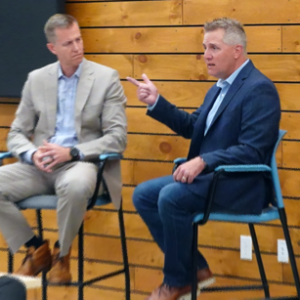 According to a global report published by Microsoft in 2022, each minute there were 34,740 password attacks, 58,980 identity threats and 60,882 email threats.Today Milwaukee is the number one cyber target in the United States. The city’s increased risk for cyberattacks is a result of the upcoming Republican National Convention, scheduled to take place in Milwaukee mid-July, said Shannon Zimmerman during a visit to the MMAC offices last week.
According to a global report published by Microsoft in 2022, each minute there were 34,740 password attacks, 58,980 identity threats and 60,882 email threats.Today Milwaukee is the number one cyber target in the United States. The city’s increased risk for cyberattacks is a result of the upcoming Republican National Convention, scheduled to take place in Milwaukee mid-July, said Shannon Zimmerman during a visit to the MMAC offices last week. Government officials and business leaders around the world are grappling with an important question: With the increased use of artificial intelligence, how can we ensure that sensitive data remains safe?Zimmerman discussed developing legislation at the state level that would leverage AI’s capabilities while maintaining proper safeguards.
“Security will be an ongoing concern. If anyone says, ‘it’s absolute, we’re defended’ they’re wrong,” said Zimmerman.
To combat security concerns, Zimmerman felt that the state should look at increasing standards and expectations around sensitive, mission-critical data.
“Let’s at least get data privacy in place, because if that’s not taken care of it doesn’t really matter because AI is going to use all of that.”
“Let’s at least get data privacy in place, because if that’s not taken care of it doesn’t really matter because AI is going to use all of that,” he said.Zimmerman emphasized that a Wisconsin data privacy act needs to be rooted in three simple steps. First, an individual should be able to ask data collectors, “What do you have on me?” This would lead to a second question, “Who have you shared it or sold it to?” Lastly, the individual should have the ability to decide whether the data collectors can continue to use the data or if they need to stop and delete the data.
Zimmerman acknowledged that for there to be involvement from the federal government, there must be a groundswell on the state level. According to a U.S. State Privacy Legislation Tracker created by the International Association of Privacy Professionals, 18 states have signed data protection laws. There are active bills in nine states.
However, Zimmerman separated the need for data privacy legislation from the regulation of AI. In fact, he said he does not want to “race to regulate.”
“I think that we need to identify thoughtfully and carefully where harm can be done,” said Zimmerman.
He pointed toward the narrative that AI will take over jobs, arguing that this is not the case. AI will augment work, making the lives of humans easier.
He also highlighted that if organizations and agencies in the public sector incorporated AI into their processes, this would increase efficiency.
“I want to see Wisconsin be the defining face and have our identity be the tech identity in the upper Midwest,” he said.
“I want to see Wisconsin be the defining face and have our identity be the tech identity in the upper Midwest.”




